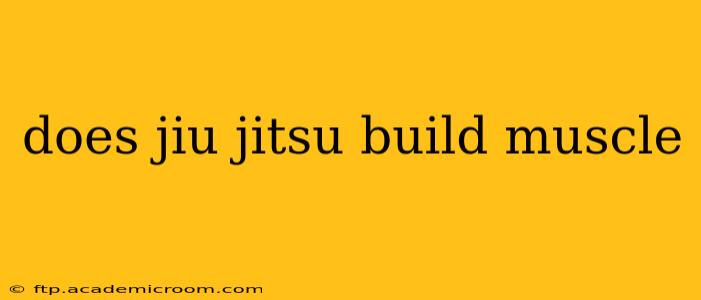Brazilian Jiu Jitsu (BJJ), a grappling martial art focusing on ground fighting and submissions, is increasingly popular. Many wonder: does BJJ build muscle? The short answer is yes, but the type and extent of muscle growth depend on several factors. It's not the same kind of muscle growth you'd see from weightlifting, but it's significant nonetheless. Let's delve deeper.
What Kind of Muscles Does Jiu Jitsu Build?
BJJ primarily builds functional strength and muscle endurance, rather than massive size. You won't necessarily get huge biceps like a bodybuilder, but you'll develop strong, defined muscles throughout your entire body. This is because BJJ involves a constant interplay of muscle groups working together. Think:
- Core Strength: Crucial for maintaining proper posture, generating power, and resisting takedowns. Expect significant gains in your abdominal and back muscles.
- Upper Body Strength: Pulling guards, escaping mounts, and performing submissions require strong arms, shoulders, and back. Think powerful grips, strong shoulders for maintaining control, and a resilient back to withstand pressure.
- Lower Body Strength: From takedowns to sweeps, your legs are constantly engaged. Expect improved leg strength, particularly in your quads, hamstrings, and glutes.
- Grip Strength: Essential for controlling your opponent and executing submissions. Your forearms will become noticeably stronger.
Does Jiu Jitsu Build Muscle Like Weightlifting?
No, BJJ doesn't build muscle in the same way as weightlifting. Weightlifting focuses on hypertrophy (muscle growth) through high-intensity resistance training. While BJJ involves resistance (your opponent), the focus is on functional strength and endurance. You'll build muscle, but the emphasis is on strength-to-weight ratio and lean muscle mass rather than sheer size.
How Much Muscle Can You Gain From Jiu Jitsu?
The amount of muscle gained from BJJ varies greatly depending on several factors:
- Training Intensity and Frequency: More frequent and intense training sessions will lead to greater muscle development.
- Diet: Proper nutrition is essential for muscle growth. A diet rich in protein is crucial for muscle repair and growth.
- Genetics: Individual genetic predispositions influence how your body responds to training.
- Body Composition: Starting body composition plays a role; leaner individuals may see more visible changes.
Will Jiu Jitsu Help Me Lose Weight?
Yes! BJJ is a fantastic way to lose weight. The high-intensity nature of training burns a significant number of calories. Combined with a healthy diet, you can effectively lose weight and build muscle simultaneously.
Does Jiu Jitsu Build Muscle Fast?
Building significant muscle mass takes time, regardless of the activity. While you'll see improvements in strength and muscle definition relatively quickly, significant hypertrophy takes consistent training over several months or even years.
What are the best exercises to complement Jiu Jitsu for muscle growth?
While BJJ itself provides a full-body workout, incorporating supplementary exercises can enhance muscle growth. Focus on exercises that target muscle groups emphasized in BJJ, such as:
- Pull-ups: Enhance back and arm strength.
- Squats: Improve leg strength and power.
- Deadlifts: Build overall strength and improve grip.
- Core work (planks, Russian twists): Strengthen core muscles crucial for BJJ.
In conclusion, BJJ is an excellent way to build functional strength, improve muscle endurance, and increase lean muscle mass. While it won't necessarily lead to massive muscle growth like weightlifting, the gains are significant and contribute to improved performance on the mats and overall fitness. Remember consistency, proper nutrition, and potentially supplemental training are key to maximizing your results.
